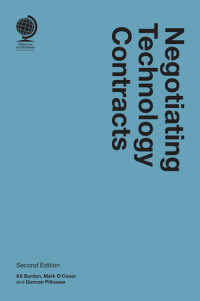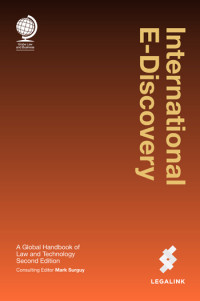
Author(s): Kit Burden, Mark O'Conor and Duncan Pithouse - DLA Piper
Publication date: Aug 2023
Format: Hardback
Pages: 329
Price: £195.00
ISBN: 9781787429796
How our eBook platform works
How permanent access, multi-user eBooks work
Add to basket (UK and Europe)Add to basket (USA, rest of world)
Add to basket (UK and Europe)Add to basket (USA, rest of world)
As technology progresses ever faster and further into an era in which AI, for example, will increasingly dominate, this book provides the beleaguered negotiator with essential and much needed advice and guidance. No one involved in the complexities of this fraught and fast-moving area of law should be without it.
,
Technology underpins everything we do, and the contracts which underpin the delivery of technology-related services are important from both an economic and social perspective. Negotiating technology-related contracts can, however, be challenging: for the uninitiated or uninformed, the significance of the points under discussion may be unclear, confusing and often at odds with the outcomes one might expect in more traditional ‘bricks and mortar’-style contracts.
To avoid unnecessarily protracted negotiations, it is essential to have a clear understanding of: (i) what each part of a technology-related contract is designed to deal with; (ii) what the customer and service provider seek to protect; and (iii) what solutions or compromises are available.
This second edition provides a practical, commercial guide to negotiations without a heavy focus on ‘black letter law’, and seeks to explain the perspectives of both sides of the negotiating table on a clause-by-clause basis, clearly setting out the key points they will want to protect – and why – while also offering suggestions as to what they may be willing to concede or compromise upon. It is written with the benefit of DLA Piper’s unparalleled view of the global market for technology sourcing and outsourcing projects, and from acting for customers and service providers in this space over many years and in many jurisdictions.
Chapters cover the common negotiating ‘battlefields’, from service descriptions and service levels through to warranties, indemnities, liability provisions and termination rights. The authors also examine issues associated with particular technology-related engagements, such as those based on agile methodologies, those involving the use of AI-based solutions, or those operating within heavily regulated sectors.
This edition will be of interest to anyone involved in technology-related contracts, whether acting for the buy side or sell side, and whether working within law firms or legal departments or more general commercial functions who have a need to understand the way in which such contracts work.









